| | 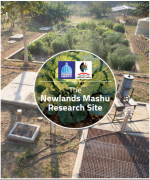 | | The Newlands Mashu Research Site (2015)
As far back as 2003, the eThekwini Municipality recognised the need to work with local tertiary organisations and a Memorandum of Understanding (MOU) was signed with three tertiary educational institutions (the University of KwaZulu-Natal, the Durban Institute of Technology and Mangosuthu Technikon). The aim of this MOU was to strengthen collaboration on research and development, capacity building and knowledge management, in order to achieve growth and development, in keeping with the Municipality’s Integrated Development Plan (IDP). | |
|
| | | | | | |
| | 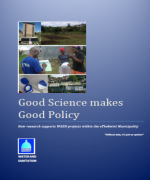 | | Good Science Makes Good Policy: How Research Supports WASH Projects Within the eThekwini Municipality (2015)
This document aims to provide a summary of various Water Sanitation and Hygiene (WASH) projects undertaken by research organisations, consultancies and tertiary educational institutions to support the Water and Sanitation Unit within the eThekwini Municipality (EWS) in the implementation of basic water and sanitation services.
| | |
| | | | | |
| | 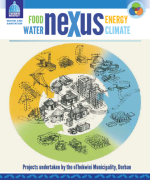 | | Nexus: Projects Undertaken By The eThekwini Municipality, Durban (2014)
This booklet aims to show case the projects undertaken by the eThekwini Municipality that fall within the food-water-energy-climate nexus. It provides an overview of the Municipality and the way in which the various Units work together to meet the common goals of service delivery and environmental and health protection. The Municipality believes that good science leads to good policy and therefore collaborates with a number of research and private organisations in order to provide scientific support for their initiatives. A description of each project is provided in the booklet together with an indication of the point at which it sits within the food - water-energy-climate nexus, and which Units within the Municipality are responsible for the project.
| | |
| | | | | | |
| | 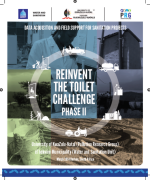 | | Reinvent The Toilet Challenge Phase II (2014)
The aim of this booklet is to introduce the research being undertaken by the Pollution Research Group (University of KwaZulu-Natal) and the eThekwini Water and Sanitation Unit (eThekwini Municipality) under the Reinvent the Toilet Challenge Phase II funded by the Bill & Melinda Gates Foundation.
| | |
| | | | | | |
| | 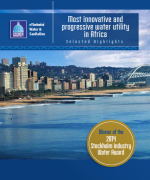 | | Most Innovative And Progressive Water Utility In Africa (2014)
The eThekwini Municipality is recognised as one of South Africa’s more competent municipalities, offering many examples of excellent public service. Within the municipality, one unit – eThekwini Water & Sanitation (EWS) – has demonstrated progressive management and innovative methods, many of which have been replicated across the country and the region.
| | |
| | | | | | |
| | 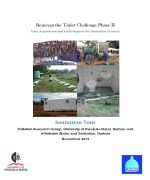 | | Sanitation Tour (2013)
This document provides an overview of a “Sanitation Tour” which can be requested to be undertaken in order to obtain an overview of the different types of sanitation technologies currently in place within eThekwini and the research being undertaken by eThekwini Water and Sanitation (EWS) and the PRG. | | |
| | | | | | |
| |
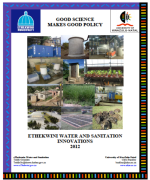 | |
The eThekwini Municipality in partnership with the Pollution Research Group are investigating a modularised Decentralised Wastewater Treatment System (DEWATS) plant for on-site waterborne sanitation. The plant was designed by the non-profit organisation, Bremen Overseas Research and Development Association (BORDA) which specialises in the design and implementation of DEWATS plants. Over 1 000 BORDA designed DEWATS plants have been implemented worldwide with the technology awarded with the prestigious International Water Association Technological Innovation Award in 2011. | | |
| | | | | | |
| | 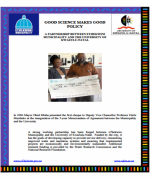 | |
A strong working partnership has been forged between eThekwini Municipality and the University of KwaZulu-Natal. Funded by the city, it has the goals of developing capacity to provide service delivery, researching improved water and sanitation systems and ensuring that implemented projects are economically and environmentally sustainable. Additional research funding is provided by the Water Research Commission and the National Research Foundation. | | |